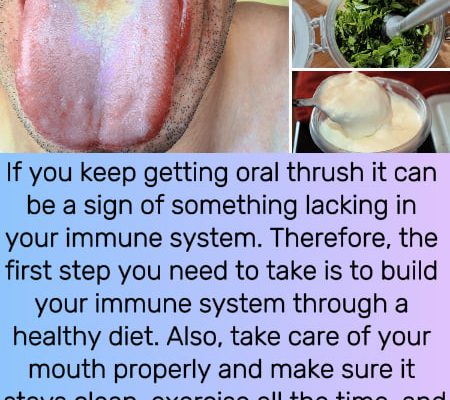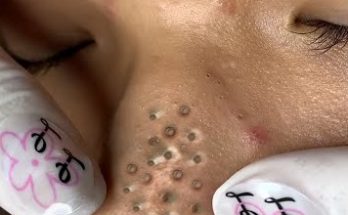Oral thrush is a common fungal infection caused by an overgrowth of Candida albicans yeast.1 While mild cases may sometimes clear up on their own or with home remedies, more severe or persistent cases often require antifungal medication prescribed by a doctor.2

Here are some commonly suggested home remedies and practices that may help manage oral thrush and support healing:
Mouth Rinses:
- Saltwater Rinse: Dissolve 1/2 teaspoon of salt in 1 cup of warm water.3 Swish the solution around your mouth for 15-20 seconds and then spit it out.4 Salt has antiseptic and soothing properties.
- Baking Soda Rinse: Mix 1/2 teaspoon of baking soda (sodium bicarbonate) in 1 cup of warm water. Swish for 15-20 seconds and spit.5 Some research suggests baking soda may have disinfectant properties against Candida.6
- Apple Cider Vinegar Rinse: Dilute 1 teaspoon of raw, unfiltered apple cider vinegar in 1 cup of water.7 Rinse for 10-20 seconds.8 Apple cider vinegar has antifungal properties.9
- Turmeric Rinse: Gently simmer 1/4 to 1/2 teaspoon of turmeric paste (or powder) with a dash of black pepper (to aid absorption) in 1 cup of warm water or milk for 3-5 minutes. Allow to cool and swish as you drink it. Turmeric contains curcumin, which has anti-inflammatory and antifungal properties.1
- Clove Oil Rinse: Steep 1 teaspoon of whole ground cloves in 1 cup of boiling water for at least 5 minutes.11 Strain and swish the liquid around your mouth. Clove oil has antiseptic and pain-relieving properties.12
- Lemon Juice Rinse/Drink: Add the juice of half a lemon to 1 cup of warm or cool water.13 You can drink this mixture or use it as a mouth rinse.14 Lemon juice is thought to have antiseptic and antifungal abilities.15 Avoid applying undiluted lemon juice directly to lesions, as it can cause irritation.
Dietary Approaches & Supplements:
- Probiotics (Yogurt or Supplements): Probiotics introduce “good” bacteria that can help restore the natural balance of microorganisms in your mouth and gut, preventing yeast overgrowth.16 Look for unsweetened yogurt with live active cultures, as sugar can fuel Candida growth. Probiotic supplements containing Lactobacillus are also an option.17
- Coconut Oil Pulling: Place 1 tablespoon of raw, virgin coconut oil in your mouth.18 Swish it around as it melts for 15-20 minutes, then spit it out.19 Coconut oil contains caprylic and lauric acid, which have shown to inhibit Candida growth.20
- Reducing Sugar Intake: Candida thrives on sugar, so limiting sugary foods and drinks can help control the yeast overgrowth.
- Garlic: Garlic is known for its antifungal properties.21 While direct application isn’t always recommended, incorporating garlic into your diet may be beneficial.
Good Oraygiene Practices:
- Brush and Floss Regularly: Maintain a consistent oral hygiene routine by brushing your teeth, gums, and tongue gently with a soft-bristled toothbrush at least twice a day and flossing daily.22
- Replace Your Toothbrush: Change your toothbrush often until the infection clears to prevent reinfection.23 Don’t share toothbrushes.
- Disinfect Dentures: If you wear dentures, clean and disinfect them daily according to your dental professional’s recommendations to prevent fungal overgrowth and reinfection.24 Remove them at night.
- Rinse After Inhalers: If you use a corticosteroid inhaler, rinse your mouth thoroughly with water and spit it out after each use to prevent thrush.2
Important Considerations:
- Consult a Healthcare Professional: While these home remedies may help with mild cases or as a complementary treatment, it’s crucial to consult a doctor or dentist, especially if symptoms are severe, don’t improve, or if you have underlying health conditions (like diabetes or a weakened immune system).26 Oral thrush can sometimes indicate other health issues.27
- Underlying Causes: Address any underlying factors that might be contributing to oral thrush, such as uncontrolled diabetes, certain medications (like antibiotics or corticosteroids), or ill-fitting dentures.28
- Infants: Oral thrush is common in babies.29 If breastfeeding, mothers may also need treatment to prevent passing the infection back and forth. Consult a pediatrician for advice on treating oral thrush in infants.
These home remedies are generally safe, but always observe how your body reacts and discontinue use if you experience any irritation or worsening of symptoms.


